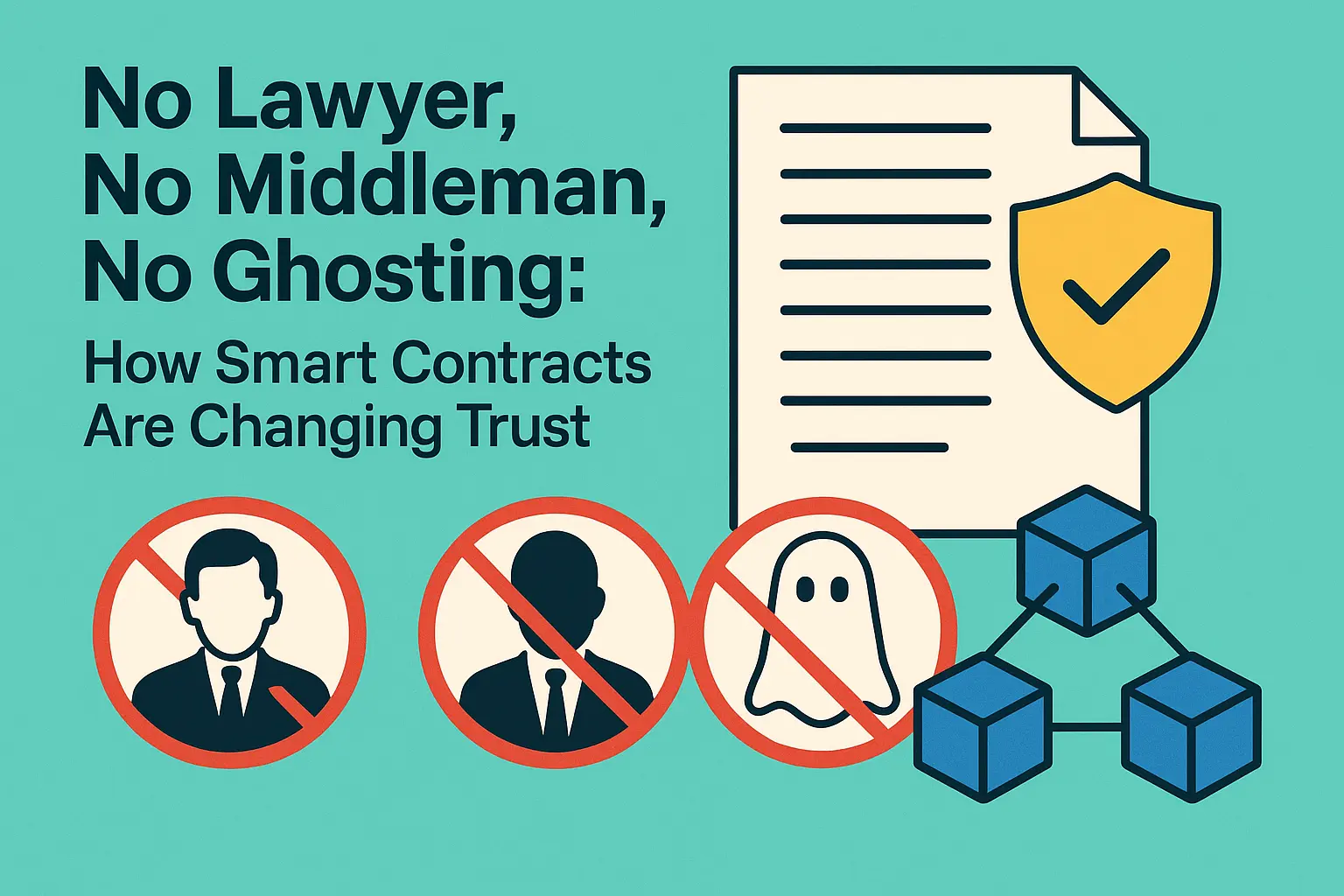The Age of Broken Promises
No matter how digital the world becomes, most agreements still hinge on one fragile thing: trust.
A tenant expects their landlord to return their deposit. A freelancer hopes their invoice will be paid. A buyer clicks “agree” and assumes the seller will deliver. But in reality, people are let down not necessarily because they made bad choices but because the systems meant to protect them are often slow, expensive, biased, or completely absent.
Legal contracts are tedious. Lawyers are costly. And enforcement? Out of reach for most. Ghosting isn’t just a dating term anymore. It’s what happens when landlords disappear, clients vanish post delivery, or employers quietly skip payday.
This widespread erosion of trust is not just personal. It’s structural. And for a generation raised on instant digital transactions, the question isn’t just how to enforce promises but how to design systems where betrayal simply isn’t an option.
That’s where smart contracts enter. Not just as tools, but as a radical shift in how trust is built, managed, and enforced.
What Smart Contracts Actually Do and Why It’s Radical
Smart contracts aren’t contracts in the traditional sense. There’s no paper, no fine print, no notary stamp. Instead, they are code based agreements stored on the blockchain that automatically execute outcomes when certain conditions are met.
Think vending machine logic: Insert payment → receive product. No persuasion, no reminders. Just execution.
But what makes them revolutionary is transparency and immutability. Once deployed, a smart contract cannot be altered without consensus. Every action is logged on chain. Visible, verifiable, and permanent.
This marks a philosophical shift. Traditional contracts have long favored those with resources: legal fluency, access, or institutional power. In contrast, smart contracts strip away interpretation. They are immune to bias, delay, or manipulation.
As Vitalik Buterin, co founder of Ethereum, puts it, smart contracts enable “credible neutrality.” A system where rules are enforced regardless of who’s involved.
Yet, for all their potential, the simplicity of code masks deeper complexities.
The Cracks in the Code: What Could Go Wrong?
Despite their promise, smart contracts aren’t a silver bullet. And critics are right to question the hype.
What happens when things go wrong?
In 2016, a flawed smart contract on The DAO led to a 60 million dollar loss due to a vulnerability in the code. Not a hack, just an unintended loophole.
What about non-technical users?
Smart contracts still require technical literacy. Most people can’t audit code or verify terms embedded in a blockchain.
Is adoption realistic in developing regions?
In countries with limited digital infrastructure, blockchain based systems face hurdles: internet access, device availability, and energy costs. For example, only 43 percent of sub Saharan Africa had internet access in 2023.
Who loses when automation wins?
Middlemen such as banks, brokers, and lawyers risk becoming obsolete in smart contract powered systems. While this may lower costs, it also threatens millions of traditional jobs globally. And the new tech economy may not offer a safety net.
Bias in code?
Yes. Code reflects the biases of its creators. A poorly written contract can still favor certain outcomes. Not by intent, but by design. And once deployed, it’s almost impossible to “argue” your case unless a system of governance is built into the protocol.
Real People, Real Smart Contracts: Stories from the Frontlines
Ravi, a freelance designer in India, used a smart contract platform to secure payment from a UK client. “Usually, I have to chase payments. But this time, the money was auto released the moment I submitted the final file,” he shared on Reddit. “It felt like the first time I had control.”
In Nairobi, a pilot project by IBM and Twiga Foods used smart contracts to issue microloans to vendors. The system removed banks entirely. It allowed women in informal markets to access working capital based on transaction data, not credit history.
In the US real estate market, startups like Propy are experimenting with blockchain based property transactions. Title transfers are logged on chain, reducing fraud and speeding up closings. But adoption is still slow due to regulatory uncertainty.
These stories show that smart contracts aren’t theoretical anymore. But they also highlight that real world success depends on context, access, and governance.
A Global Picture: Uneven Recognition and Regulation
While some countries are embracing smart contracts, others are skeptical or outright hostile.
Legally Recognized:
In Arizona and Tennessee, smart contracts are legally recognized as enforceable.
The EU’s Markets in Crypto Assets regulation, set to go live in 2025, lays groundwork for smart contract oversight.
China’s BSN initiative is piloting blockchain based smart contract platforms despite banning crypto trading.
Legally Gray:
In India’s Maharashtra region, smart contracts were used to record land ownership, but they’re not yet legally binding nationwide.
In most countries, smart contracts lack legal standing, and disputes often fall back on traditional courts.
This patchwork makes cross border enforcement tricky. Trustless tech may execute seamlessly. But what happens when parties disagree, and jurisdiction is unclear?
The Future of Fairness: Programmable but Not Perfect
Smart contracts may not replace all legal agreements. But they force a rethink of what fairness looks like in digital systems.
They promise accountability without needing trust. A bold idea in a time where trust in institutions is eroding. But that doesn’t mean the answer is pure automation. The future lies in hybrid models. Ones where human judgment and machine precision coexist.
Here’s what to expect: More “code assisted” contracts in business and finance Open source smart contract libraries for public verification Tools that allow non coders to build and verify agreements Demand for auditors, ethicists, and conflict resolution protocols in Web3 ecosystems.
In the end, smart contracts don’t abolish trust. They recode it. Instead of relying on goodwill or authority, we begin to rely on shared systems, visible rules, and transparent logic.
The question isn’t whether we trust the people. It’s whether we trust the process.
 Jayansh
Gaba
Jayansh
Gaba